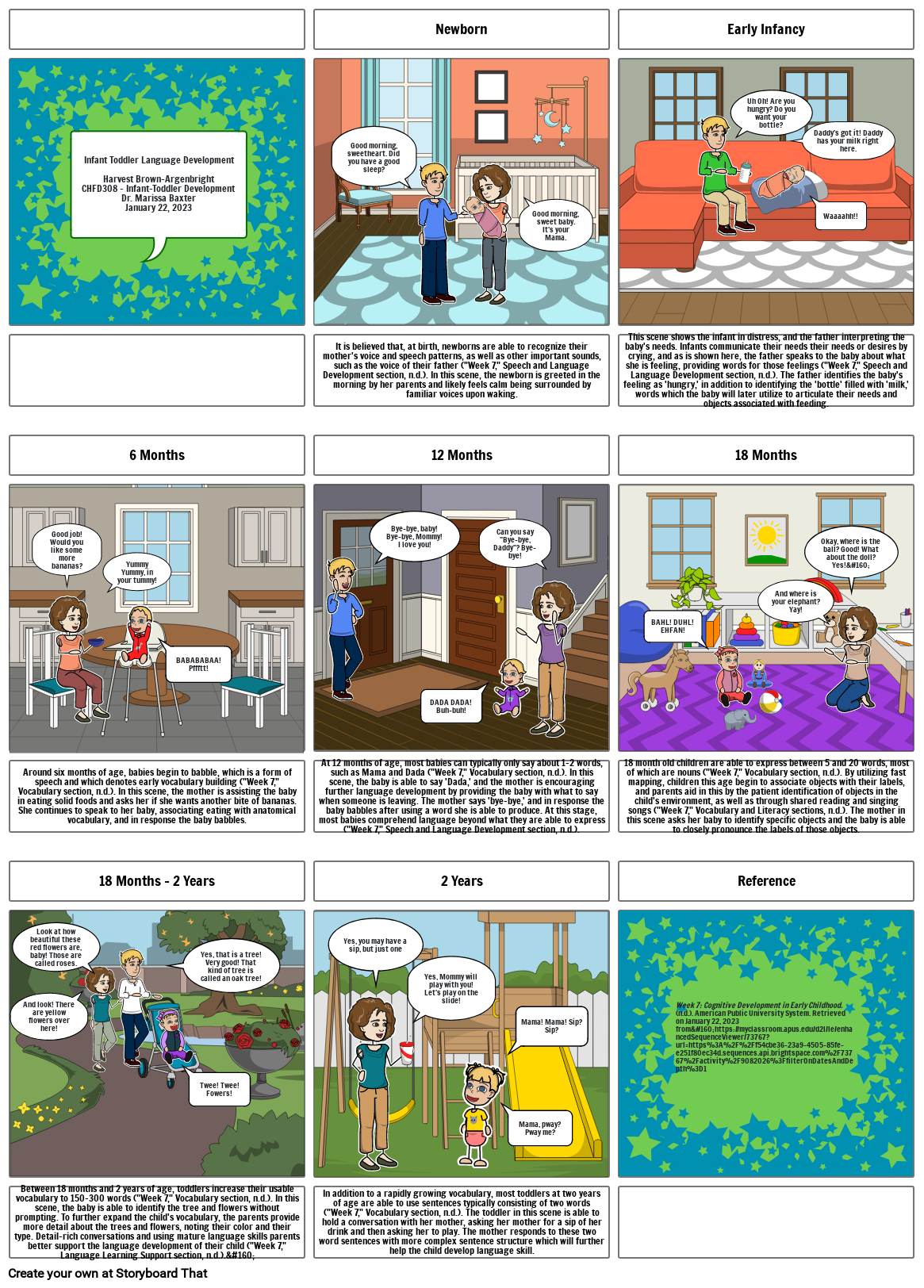Language Development

Storyboard-Text
- Infant Toddler Language DevelopmentHarvest Brown-ArgenbrightCHFD308 - Infant-Toddler DevelopmentDr. Marissa BaxterJanuary 22, 2023
- Newborn
- Good morning, sweetheart. Did you have a good sleep?
- Good morning, sweet baby. It's your Mama.
- Early Infancy
- Uh Oh! Are you hungry? Do you want your bottle?
- Daddy's got it! Daddy has your milk right here.
- Waaaahh!!
- 6 Months
- Good job! Would you like some more bananas?
- It is believed that, at birth, newborns are able to recognize their mother's voice and speech patterns, as well as other important sounds, such as the voice of their father (Week 7, Speech and Language Development section, n.d.). In this scene, the newborn is greeted in the morning by her parents and likely feels calm being surrounded by familiar voices upon waking.
- 12 Months
- Bye-bye, baby! Bye-bye, Mommy!I love you!
- Can you say Bye-bye, Daddy? Bye-bye!
- This scene shows the infant in distress, and the father interpreting the baby's needs. Infants communicate their needs their needs or desires by crying, and as is shown here, the father speaks to the baby about what she is feeling, providing words for those feelings (Week 7, Speech and Language Development section, n.d.). The father identifies the baby's feeling as 'hungry,' in addition to identifying the 'bottle' filled with 'milk,' words which the baby will later utilize to articulate their needs and objects associated with feeding.
- 18 Months
- Okay, where is the ball? Good! What about the doll? Yes!
- Around six months of age, babies begin to babble, which is a form of speech and which denotes early vocabulary building (Week 7, Vocabulary section, n.d.). In this scene, the mother is assisting the baby in eating solid foods and asks her if she wants another bite of bananas. She continues to speak to her baby, associating eating with anatomical vocabulary, and in response the baby babbles.
- Yummy Yummy, in your tummy!
- BABABABAA! Pffftt!
- At 12 months of age, most babies can typically only say about 1-2 words, such as Mama and Dada (Week 7, Vocabulary section, n.d.). In this scene, the baby is able to say 'Dada,' and the mother is encouraging further language development by providing the baby with what to say when someone is leaving. The mother says 'bye-bye,' and in response the baby babbles after using a word she is able to produce. At this stage, most babies comprehend language beyond what they are able to express (Week 7, Speech and Language Development section, n.d.).
- DADA DADA! Buh-buh!
- BA! DUH!EH!
- And where is your elephant?Yay!
- 18 Months
- And look! There are yellow flowers over here!
- Look at how beautiful these red flowers are, baby! Those are called roses.
- Yes, that is a tree! Very good! That kind of tree is called an oak tree!
- Twee! Twee!
- Two Years
- Yes, you may have a sip, but just one
- Yes, Mommy will play with you! Let's play on the slide!
- Mama, play?Play wif me?
- Mama! Mama! Sip? Sip?
Über 30 Millionen erstellte Storyboards

